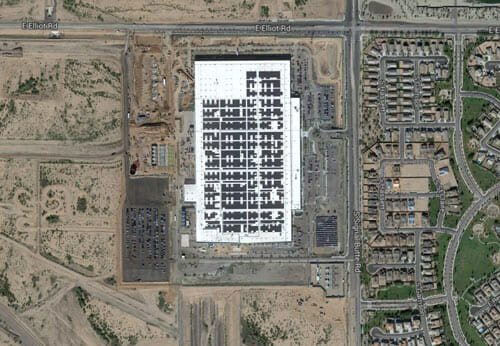The Graveyard of Cronyism
Phoenix businesses add hundreds of jobs every week. However, the only jobs that every get subsidized are in sexy businesses. That is because the subsidies themselves make zero sense, from an economic or public policy standpoint. The point is not to create jobs, but to create press releases and talking points for politicians and their re-election campaigns.
And there is little that is sexier to politicians spending taxpayer money to get themselves re-elected than solar and Apple computer. Which brings us to this plant in Mesa (a suburb of Phoenix), which I am calling the Graveyard of Cronyism.
This plant was built by First Solar to build solar panels. I would have to quit my day job and work full-time to figure out all the ways this plant was subsidized by taxpayers -- special feed-in tariffs for First Solar customers, government tax breaks for solar panel purchases, direct government subsidies and grant programs for solar panel purchases, the DOE loan guarantee program for solar... etc. In addition, the City of Mesa committed $10 million in infrastructure improvements to lure First Solar to the site. I can't find what economic development incentives there were but there must have been tax abatements. In addition, the company was promised a further $20 million in economic development funds from the County, but fortunately (unlike most such deals) the funds were tied to hitting employment milestones and were never paid. First Solar never produced a single panel at the plant before it realized it had no need for it.
More recently, Apple and sapphire glass manufacturer GT Advanced bought the empty plant from First Solar. And again there was much rejoicing among politicians locally. Think of it -- Two great press release opportunities for politicians in just three years for the same plant! I never feel like we get the whole story on the development deals offered for these things but this is what we know:
Brewer and the Arizona Legislature approved tax breaks related to sales taxes on energy at manufacturing plants. The state also put the Apple/GT plant into a special tax zone that pays a 5 percent commercial property tax rate. Most Arizona companies pay a 19 percent rate this year and an 18.5 percent next.
[In addition,] Apple was slated to received [sic] $10 million from the Arizona Competes Fund for the Mesa factory. The Arizona Commerce Authority — the privatized state economic development agency which administers the $25 million sweeten-the-deal fund along with Gov. Jan Brewer — said neither Apple nor GT Advanced (Nasdaq: GTAT) have received any money.
Well, it turns out that artificial sapphire sounds really cool (a pre-requisite for crony deals) but it is not so great for cell phones. Apple went another way and did not use the technology on iPhone 6 -- not just for timing reasons but because there are real issues with its performance.
So a second crony buys the plant and does not even move in.
What's next? I am thinking the best third tenant at the sexy-crony nexus would be an EV battery plant, or even better yet Tesla. It is too bad Fiskar motors went out of business so soon or they would be the perfect next crony fail for this site.
